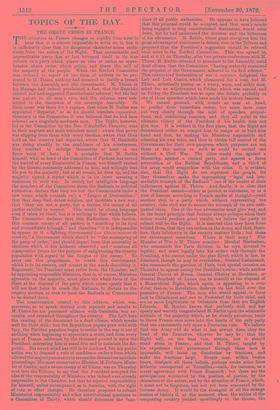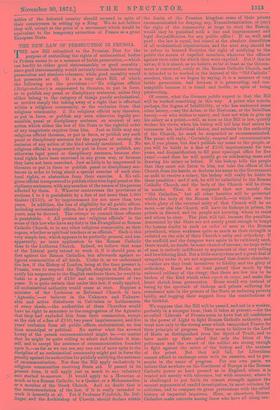TOPICS OF THE DAY.
THE GRAVE CRISIS IN FRANCE. THE situation in France changes so rapidly from hour to hour that it is almost impossible to write on it, but it is sufficiently clear that its dangerous character arises exclu- sively from the action of the Right. That unteachable and impracticable party has at last betrayed itself in its true colours, as a party which places an idea or rather an appre- hension above order, above policy, and above the will of the majority of the people. When the Kerdrel Committee was ordered to report on the form of address to be pre- sented to M. Thiers, nothing had occurred to justify a breach between the Assembly and the Government. M. Thiers in his Message had indeed proclaimed a fact, that the Republic existed, and had suggested Constitutional reforms ; but the fact was patent to all men's eyes, and the reforms were sub- mitted to the discretion of the sovereign Assembly. So little cause was there for a rupture, that when M. Batbie was appointed "Reporter," or as we should translate rapporteur, Secretary to the Committee, it was believed that he had been selected as a singularly moderate man. The Right, however, led in the Committee by the Due d'Audriffet Pasquier, were in their angriest and most truculent mood ; aware that power was slipping from them with every election, aware that their hold on the country had departed, aware that M. Gambetta was rising steadily in the confidence of his countrymen, they resolved to indulge themselves at least in one fierce burst of hate. It is probable that M. Batbie himself, who, as head of the Committee of Pardons, has earned the hatred of every Communist in France, was himself excited by the threats constantly addressed to him, and willingly lent his pen to the majority; but at all events, he drew up, and the majority signed, a report which is in its inner meaning a summons to civil war. In stately but intelligible language the members of the Committee doom the Radicals to political extinction, declare that they are but the Communists under a new name, which conceals only a "League of Destruction ;" that they deny God, detest religion, and meditate a new war ; that "they are not a party, but a faction, the enemy of all parties entitled to respect." This would be strong language even if taken by itself, but it is nothing to that which follows. The Committee declares that this Radicalism, this faction, this common enemy of all parties, is "marching to its legal and irremediable triumph," and therefore "it is indispensable to oppose to it a fighting Government (un Gouvernement de combat)," a Government which should be "the mainspring of the party of order," and should depart from that neutrality in elections which it has hitherto observed ; and "combine all conservative forces for the purpose of enlightening the country population with regard to the designs of the enemy." To carry out this programme, to create this Government, which is in its essence, and almost in the words describing it, Napoleonic, the President must retire from the Chamber, and by appointing responsible Ministers, that is, of course, Ministers agreeable to the majority, must place the whole force of the State at the disposal of the party which avows openly that it will use that force to crush the Radicals, to dictate to the country electors, or even to treat the Radicals as Communists to be warred down.
The consternation created by this address, which was, moreover, so to speak, shotted with reproofs and insults to M. Thiers for his presumed alliance with Gambetta, was ex- cessive, and extended throughout the country. The Left bore the reading of the document in a dead silence, which speaks well for their drill ; but the Republican papers grew wild with fury, the Parisian populace began to seethe in the way it has of seething when beginning to appreciate a crisis, and from every part of France addresses by the thousand poured in upon the President, entreating him to stand firm and to maintain the Re- public. His secret mind has still to be disclosed, but his public action was to demand a vote of confidence under a form which allowed the majority once more to reconsider themselves and their proceedings. His most conservative Minister, M. Dufaure, Minis- ter of Justice, and a sworn enemy of all *Ultras, was on Thursday sent into the Tribune, to say that the President accepted the idea of the responsibility of Ministers, who indeed were already responsible to the Chamber, but that he rejected responsibility for himself, unless accompanied, as in America, with the right of veto or other changes. He therefore proposed to submit Ministerial responsibility and other constitutional questions to a Committee of Thirty, which should determine the func- tions of all public authorities. He appears to have believed' that this proposal would be accepted, and that men's minds being engaged in long constitutional discussions, would calm. down, but he had underrated the decision and the bitterness of his adversaries. M. Batbie, whose giant size gives him the great advantage of visibleness in debate, rose in the Tribune and proposed that the President's suggestion should be referred. once more to the Kerdrel Committee. This was agreed to, and at 6.15 on Thursday, after two private conferences with M. Thiers, M. Batbie returned to announce to the Assembly, amid. dead silence, that the Committee, "having maturely examined: the proposal of the Government, adhered to its first scheme.' This unexpected declaration of war a outrance, delighted the Left and Left Centre, which clamoured for a vote, but M.. Thiers, artistically posing as a weary, worn, and sickly man, asked for an adjournment to Friday, which was carried, and on Friday the President was to .open the debate probably in one of those speeches which have made his oratory famous. We cannot pretend, with events so near at hand; to predict their immediate course, but some facts come out very clearly through the mist of speeches, proposi- tions, and conflicting rumours, and they all point to the ultimate victory of the President if his health does not give way. It is evident in the first place, that the Right are determined either to compel him to resign or to bind him hand and foot, by making his Ministers responsible and silencing his own voice, and thus to obtain full control of the Government for their own purposes, which purposes are not those of the nation or such as could be carried out without a Civil War. The cities would rise against a Monarchy, against a clerical party, and against a fierce persecution of the Radical Republicans, and a third of the army would sympathise with the cities. It is evident, also, that the Right do not represent the people, for they themselves make the approaching "legal and irre- mediable triumph of the Radicals" one of the counts of their indictment against M. Thiers. And finally, it is clear that the President cannot—either as patriot, as statesman, or as a man of honour, according to French modes of thought—yield. another step to a party which, without representing the country, risks civil war to secure the triumph of its own anti- quated ideas. One of the two adversaries must give way, and. on the broad principle that Junkers always collapse when their action would produce great results, we believe the party to submit will be the Right. It is asserted that they have force behind them, that they can reckon on the Army, and that, there- fore, their inferiority in the country matters little ; but those are extravagant assertions. Where is their army ? The Minister at War is M. Thiers' nominee ; Marshal Macmahon„ who commands the Paris division, is, he says, devoted to legality, and must legally take his orders only through the President, who cannot under the plan Rivet, which is law, be dismissed, though he may be overridden ; General Ladmirault, who commands the garrison of Paris, took special occasion on Thursday to appear among the President's suite ; while neither General Ducrot at Rouen, General Chanzy at Bordeaux, or General Bourbaki at Lyons, can be heartily at the disposal ci a Monarchical Right, which again, in appealing to a coup d'etat, that is, to Revolution, destroys its last hold over the peasantry of France. The men who would appeal to force. look to Chiselhurst and not to Frohsdorf for their chief, and are no more Legitimists or Orleanists than they are English Liberals. M. Rouher knows that perfectly well, and has. openly and warmly congratulated M. Batbie upon the admirable attitude of the majority which, as he clearly perceives, tends- to throw France once more into the hands of the only party that can consistently rely upon a Pre3torian vote. We believe that the Army will do what it has always done, obey the of the Executive, whoever he may be ; that the- Right will, on the final vote, abstain, lest it should stand alone in France ; and that M. Thiers, taught by his experience that government through these men is impossible, will insist on dissolution by fractions, and make the fractions large. Events may, within twelve hours, dissipate all these beliefs, perhaps evoke some force hitherto unsuspected at Versailles,—such, for instance, as a secret agreement with Prince Bismarck ; but these are the anticipations warranted by the position of parties, by the characters of the actors, and by the situation of France, which, it must not be forgotten, has not yet been evacuated by the German Army. It would be the strangest of all the strange ironies of history if, at the moment when the nobles of the conquering country yielded unwillingly to the throne, the
nobles of the defeated country should succeed in spite of their countrymen in setting up a Sing. We do not believe they will, except at the price of a movement which would be equivalent to the temporary extinction of France as a great European* State.



































 Previous page
Previous page